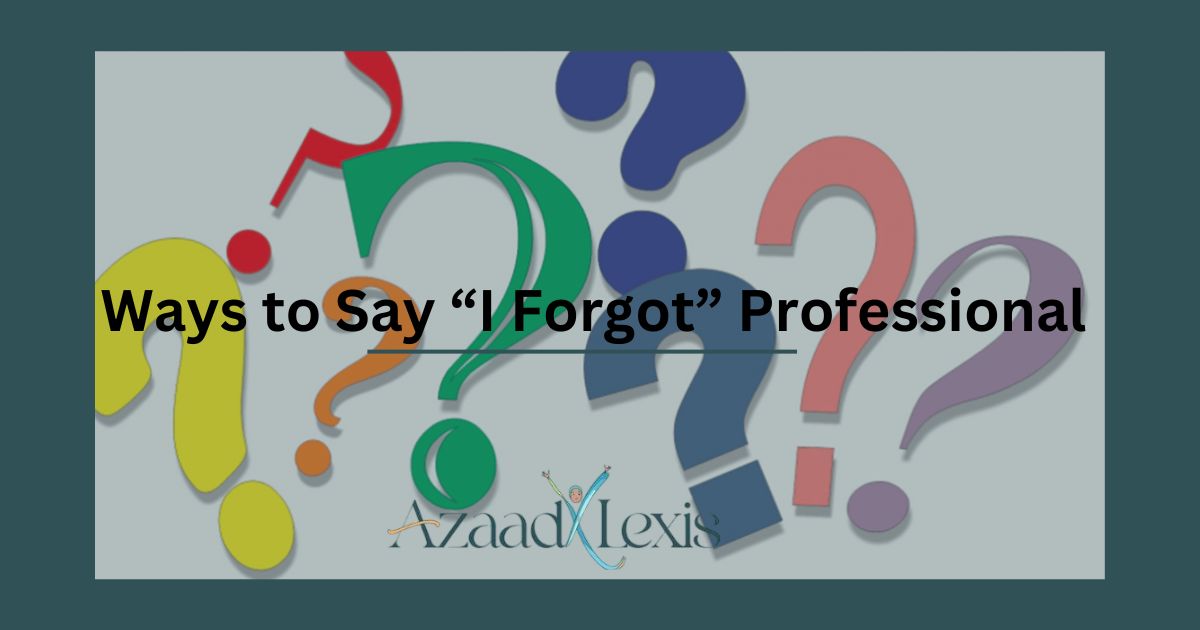Whether it’s missing a deadline, forgetting a meeting, or simply overlooking a minor detail, the way you express “I forgot” can impact how others perceive your reliability and accountability. Using professional language not only demonstrates responsibility but also helps build trust with colleagues, clients, and supervisors.
In many cases, forgetfulness isn’t about negligence, but rather a common human experience. The key is to communicate in a way that conveys sincerity and accountability while avoiding any negative consequences. By choosing the right words, you can handle situations gracefully, ensuring that your interactions remain productive and respectful.
This article will explore various professional ways to say “I forgot.” From simple phrases to more nuanced expressions, these alternatives allow you to navigate different situations with clarity and professionalism. With practical guidance on how and when to use each phrase, you’ll be equipped to maintain your credibility in any professional setting.
Why It’s Important to Say “I Forgot” Professionally
In a professional environment, communication plays a vital role in fostering positive relationships, maintaining clarity, and ensuring smooth workflows. Saying “I forgot” may seem like a simple statement, but the way it is conveyed can significantly impact how others perceive your professionalism. When you use professional language, it demonstrates responsibility, accountability, and respect for the task at hand.
Using a professional tone helps avoid misunderstandings, especially in workplace interactions. It prevents embarrassment and shows that you acknowledge the oversight without making excuses. Additionally, it keeps conversations productive and focused on finding solutions, rather than creating blame or confusion. Being concise, clear, and respectful when admitting a mistake or forgetfulness enhances trust and strengthens your professional image.
Common Phrases to Say “I Forgot” Professionally
When you need to express forgetfulness in a professional setting, using appropriate phrases is key to maintaining a respectful and accountable attitude. Below are some of the most widely accepted and professional ways to say “I forgot.”
It Slipped My Mind
This phrase is commonly used when something momentarily escapes your attention. It indicates that the task wasn’t fully processed at the moment.
It Escaped My Notice
This phrase implies that something important didn’t catch your attention at the right time. It shows that the oversight was unintentional and not willful.
I Overlooked It
“I overlooked it” is a straightforward way to admit that a task or detail was unintentionally ignored. It shows that attention was not fully given to the matter at hand.
I Failed to Remember
This phrase indicates that you did not retain the information in your memory. It suggests a genuine lapse in remembering something important.
It Didn’t Cross My Mind
This expression reveals that the item or task simply didn’t come into your thoughts at the moment it needed to be considered.
Other Professional Alternatives to Say “I Forgot”
In addition to the common phrases, there are several other ways to express forgetfulness in a professional tone. These alternatives allow you to adapt your language based on the situation and audience.
I Neglected to Recall
This phrase shows that you failed to remember something, typically due to external distractions or competing priorities.
It Evaded My Memory
This phrase subtly conveys that the memory of the task didn’t stick in your mind, making it harder to recall.
I Omitted It Unintentionally
“I omitted it unintentionally” refers to an accidental forgetting, where you didn’t do something because it simply wasn’t top of mind.
I Misplaced the Reminder
This expression indicates that you had forgotten because you lost a reminder or key detail that triggered your memory.
It Wasn’t On My Radar
This phrase implies that the task or detail wasn’t something you had noticed or anticipated at that moment.
When and How to Use Different Phrases
Depending on the situation and your communication style, certain phrases may be more appropriate than others. It is important to carefully choose the right language to ensure clarity and professionalism.
Situations Where “It Slipped My Mind” Is Appropriate
This phrase is best used in casual, informal professional environments or when a simple, non-critical mistake occurs. It works well in light conversation where you want to maintain a friendly, approachable tone.
Times to Use “It Escaped My Notice”
“It escaped my notice” is useful when the oversight was something minor and unintentionally missed, without major consequences. Use this in communications where you want to show sincerity but minimize the severity of the mistake.
Appropriate Scenarios for “I Overlooked It”
This phrase is ideal for situations where you genuinely missed a key detail due to distractions or multitasking. It reflects honest acknowledgment without assigning blame to others.
Situations for “I Failed to Remember”
“I failed to remember” works well when you want to admit a lapse in memory regarding something important, showing accountability without sounding careless.
Frequently Asked Questions
Why is it important to say “I forgot” professionally?
Saying “I forgot” professionally helps maintain a positive image by demonstrating accountability and responsibility in the workplace.
What are some common professional phrases to say “I forgot”?
Common phrases include “It slipped my mind,” “It escaped my notice,” and “I overlooked it.”
How can I choose the right phrase to say “I forgot”?
You should select a phrase based on the situation, the severity of the oversight, and the tone you wish to convey.
When should I use “I neglected to recall”?
Use “I neglected to recall” when competing priorities or external distractions led to forgetting something important.
What’s the best way to respond if I forget something at work?
The best approach is to acknowledge the oversight, apologize sincerely, and offer a solution to prevent future occurrences.
Conclusion
Communicating professionally, even when admitting to mistakes, is crucial for maintaining credibility and respect in the workplace. Using the right language to say “I forgot” can help you navigate situations with grace and responsibility. Remember, forgetfulness happens to everyone—what sets professionals apart is how they handle it and take steps to ensure it doesn’t happen again. By choosing the appropriate phrases, being sincere, and offering solutions when needed, you can ensure your interactions remain positive and productive.


